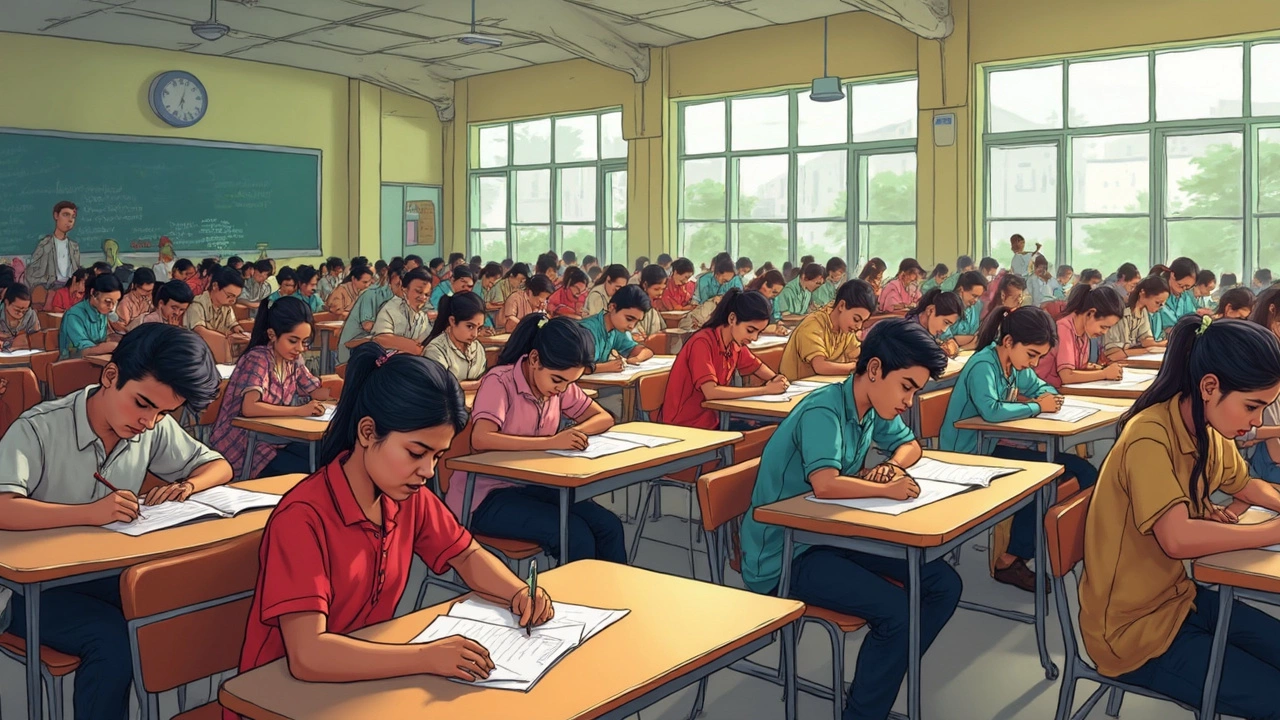So you're dreaming of cracking the IITs, huh? That's awesome! But first, let's get the details straight about the two big hurdles you'll face: JEE Mains and JEE Advanced. They're not just two steps in a process; they're like comparing apples to oranges—but both are super important to reach the final goal.
JEE Mains is the first stop for many aspiring engineers in India. It's like the wide gate that opens up opportunities for a host of engineering colleges, not just the IITs. But if we're talking IITs specifically, JEE Mains is just the appetizer. You've got to nail it to even get a shot at JEE Advanced, which is the gateway to the coveted IITs.
The two exams test different skills and have different formats. Yes, they both focus on physics, chemistry, and math, but the level of difficulty jumps significantly in JEE Advanced. It's crucial to know these differences because they totally change how you prep for each exam. Understanding this can not only save your time but can make your preparation way more focused.
Basics of JEE Mains
Alright, let's jump into the world of JEE Mains. This exam is the first hurdle for your engineering dreams. Conducted by the National Testing Agency (NTA), JEE Mains is a national level exam that opens doors to numerous engineering colleges, including NITs and IIITs, all over India.
Think of JEE Mains as the foundation. If you've got strong basics in Physics, Chemistry, and Math from your 11th and 12th grades, you're in a good spot. It's usually conducted twice a year, typically in January and April, which gives you a second chance if the first attempt doesn't go your way.
So what's the format like? Well, JEE Mains includes two papers: Paper 1 is for B.E./B.Tech courses, which is the most common focus, while Paper 2 is for B.Arch and B.Planning. Paper 1 is fully computer-based, testing you on physics, chemistry, and math, with each section carrying equal weightage. It's got multiple-choice questions (MCQs) along with numerical value-based questions. Each right answer bags you 4 marks, but wrong ones take away 1 mark. Ouch, right?
Here's where it gets strategic: understanding the weightage of different topics can help you rack up more points. Spend more time mastering high-weightage topics like Coordinate Geometry and Electrostatics.
Fun fact? In 2024, over 10 lakh students registered for the exam! Sneaking into the top percentile is the challenge, so having a smart prep strategy can make all the difference.
Digging Into JEE Advanced
Alright, so you've smashed JEE Mains, and now you're staring at the monster: JEE Advanced. This exam is the real deal if you're eyeing those top IIT spots. It's designed to challenge not just what you know, but how you think. The questions often have multiple answers, and there could be negative marking for incorrect answers—so, yeah, it can be brutal.
The JEE Advanced isn't just an extension of JEE Mains. The depth of the questions goes way beyond. You need a firm grasp on concepts and the ability to apply them in complex scenarios. For example, a math problem won't just ask you to solve an equation; it might need creative trigger functions or deep calculus understanding to unravel.
Here's a key thing to chew on: The exam happens in two parts, both held on the same day. Each paper lasts three hours and includes Physics, Chemistry, and Mathematics. Any guesses? Yep, your energy and focus need to be top-notch all day long. If you're thinking of hitting the books last minute, that's a no-go. Consistency and clarity in understanding concepts are everything here.
And hey, here's a little trivia: In a recent year, around 2.5 lakhs students qualified for JEE Advanced, but only about 16,000 seats were up for grabs in IITs. So you know the competition's fierce.
How do you prep for all this? Here's a bite-sized strategy:
- First off, cover your basics. Don't skip this step because JEE Advanced twists and turns around these core concepts.
- Practice problem-solving like a sport. Time yourself, challenge yourself with tougher problems, and don't forget those multiple-correct types.
- Maintain a cheat sheet of your weak points. Tighten those areas regularly instead of leaving them till the end.
- Simulate test conditions before the actual day. Make sure you’re comfortable tackling this six-hour marathon with minimal breaks.
Taking a step back, understanding what makes JEE Advanced tick will make your prep more targeted—and hopefully, take you one step closer to rocking the IIT scene.

Comparing Their Formats
Alright, let's break down how JEE Mains and JEE Advanced are structured because the way they’re set up really decides how you need to approach your studies for each one.
JEE Mains is a bit like an initial filter. It's conducted in two papers, with Paper 1 being for B.E./B.Tech courses and Paper 2 for B.Arch/B.Planning courses. Paper 1 is a computer-based test and is the more popular one. It has multiple-choice questions based on physics, chemistry, and math. Now, let's see how tricky these formats can get: Paper 1 has a set of equal marks for each subject with negative marking, sure, but the game is all in managing time between solving questions and checking for mistakes.
On the other hand, when we talk about the JEE Advanced, it's a whole different ball game. It's considered more challenging with its unique and time-bomb style questions. There's no fixed pattern, and it changes every year to throw curveballs at students. It comprises two papers, both mandatory. These aren't just multiple-choice questions; you can expect to grapple with integer-type questions and those with multiple correct options.
"Preparing for JEE Advanced is like a marathon that requires deep focus and problem-solving skills, different from the sprint-like approach of JEE Mains," says Ramesh Prasad, a renowned IIT coaching expert.
To give you a snapshot comparison:
| Feature | JEE Mains | JEE Advanced |
|---|---|---|
| Type | Computer-based, objective | Computer-based, mixed types |
| Number of Papers | 1 (main for engineering) | 2 (both mandatory) |
| Question Type | MCQs | MCQs, integer-type, multiple correct |
| Negative Marking | Yes | Varies |
| Level of Difficulty | Moderate | High |
Understanding these differences is crucial because while you might focus on speed and accuracy for JEE Mains, JEE Advanced demands a deeper conceptual understanding and a strategic approach. This insight should help you switch gears effectively between the two exams!
Why These Differences Matter
Understanding the differences between JEE Mains and JEE Advanced isn't just trivia—it's a critical part of your game plan. Each has its unique goals and targets, so knowing what each exam wants from you can be the secret sauce to your success.
JEE Mains is the jack-of-all-trades. It gives you access to a whole list of engineering colleges, including the NITs, IIITs, and CFTIs. It's all about testing your broad understanding and speed since it's a gateway for many. But when it comes to JEE Advanced, things get more intense. This exam dives deep into your knowledge and understanding. It's crafted to assess how well you can think critically and solve complex problems under pressure.
So why does this matter? Because your prep strategy needs to change based on which exam you're targeting. For JEE Mains, you'd focus on covering the syllabus thoroughly and practicing mock tests to improve speed and accuracy. On the other hand, excelling in JEE Advanced means you dig deeper into concepts and focus more on problem-solving skills with rigorous practice of advanced questions.
Let's talk numbers to drive the point home. Did you know that roughly over 1.5 million candidates tackle JEE Mains annually, and only about the top 2,50,000 get to take on JEE Advanced? This means your mindset shifts from beating the crowd in Mains to competing with the best in Advanced.
At the end of the day, these differences shape your studying game and determine how efficiently you reach your ultimate goal—grabbing that ticket into the IITs. So, dive into each exam’s specifics and tailor your approach, and you'll be setting yourself up for success, one exam at a time!

